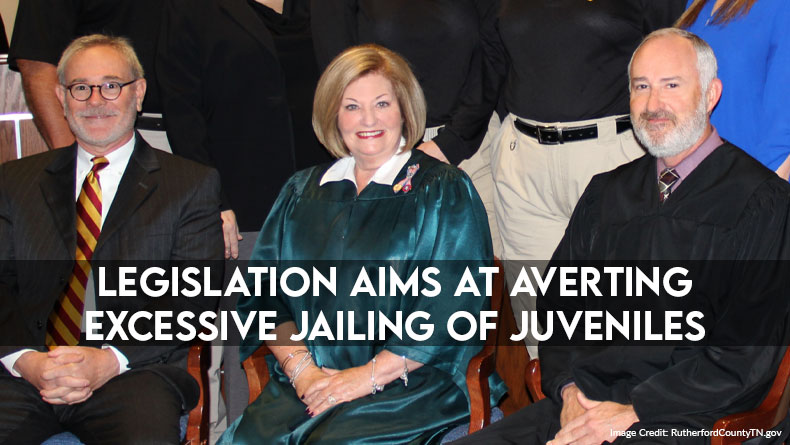Rutherford County settled for $6M in illegal detention case.
Photo: A bill seeks to regulate the arrests of juveniles after former Rutherford County Juvenile Court Judge Donna Scott Davenport, in green judicial robes, came under fire in 2022 for the detention of more than a thousand children. Photo Credit: RutherfordCountyTN.gov
By Sam Stockard [Tennessee Lookout -CC BY-NC-ND 4.0] –
Still stinging from a $6 million settlement against Rutherford County over child arrests, state Rep. Mike Sparks is pushing legislation he believes would have stopped the aggressive lockup of children.
Sparks, a Smyrna Republican, is preparing legislation prohibiting interviews or interrogations of children without the presence of legal counsel, parent, guardian or custodian. In addition, children would be told of their constitutional rights to legal representation when taken into custody, and a video recording of any interviews would be made.
“You can have good motives, but you can’t invent laws,” Sparks says.
Sparks says he’s been told if a similar bill he sponsored six years ago had passed, it would have prevented the class action lawsuit against Rutherford County that led to a $6 million payout in 2021 to more than a thousand people who were illegally detained as children in the county’s juvenile jail. The settlement’s initial estimate was $11 million, but the figure took a dip when fewer people applied to receive funds from the lawsuit’s outcome.

Whether such legislation would have prevented the lawsuit is difficult to predict because the policy that led to arrests had been in effect since 2003. But it might have lessened the impact.
Juvenile Court Judge Donna Davenport stepped down in 2022 following reports by ProPublica and Nashville Public Radio about her arrest and detention policy. The Murfreesboro Post reported on the matter extensively in 2016-17, as well as the lawsuits.
News reports showed Rutherford County was jailing juveniles at a 48% rate on Davenport’s watch compared to a state average of 5% in 2014.
Democratic lawmakers also were prepared last January to pass legislation removing her from the bench. Davenport opted to retire in July rather than seek re-election and was replaced by Murfreesboro attorney Travis Lampley, who won the August 2022 election.
Davenport’s retirement and the class-action lawsuit against Rutherford County stemmed, in part, from community outrage over a 2016 incident in which Hobgood Elementary School students were handcuffed and taken to juvenile detention in connection with a neighborhood fight. They were charged with facilitating an assault, even though such a charge did not exist.
Daryl South, a Murfreesboro attorney involved in Juvenile Court cases, says Sparks’ legislation won’t get at the root of the problem.
For instance, if a child is caught skipping school and picked up by authorities for petty theft, the youth should be apprised of his right to have an attorney or his parents present, but the youngster might not know whom to call or his parents might not be able to get off work.
The proper routine would be to issue the child a summons for the offense ordering the youth to court at a later date, South says.
The bill to ensure minors are notified they have the same right to counsel as adults stems from a longstanding practice in Rutherford County of arresting and detaining minors — a practice that led to a class action lawsuit and has cost the county $6 million.
“He’s not questioned before that, not interrogated before that, he’s not detained before that, and then he shows up … with his attorney or his parents or both,” South says.
Sparks, nevertheless, points out that as of 2016, two dozen states required police to allow parents to be informed and present during interrogations of their children and 19 states required those interrogations to be recorded.
He also notes that Tennessee has no minimum age for the arrest or questioning of a child by police and that no guidelines exist to ensure children understand they have the same right to an attorney as an adult.
Two Democrats who were ready to oust Davenport last year, state Rep. Gloria Johnson of Knoxville and state Sen. Heidi Campbell of Nashville, want to study Sparks’ legislation, but they note they would be willing to support anything that protects children’s rights within the juvenile justice system.
“This woman in this case in Murfreesboro, they didn’t care about the laws. They just ran over you anyway. They ignored the laws and created their own,” Johnson says. “So I don’t know if it would stop that. However, anything we can do to make sure that children aren’t treated unjustly, we should do that.”
Campbell says she backs “transparency” and increased support for children going through the legal process.
“I also think we have to take into consideration the culture of that court system was what was driving those arrests. There were a lot of people looking the other way, so I’m not sure this legislation would fix that, but I think it’s a step in the right direction,” Campbell says.
U.S. District Court Judge Waverly Crenshaw in 2017 ordered Rutherford County to stop detaining minors until they could receive a hearing, and he raised questions about an “always arrest” policy that had been in place for years. His decision cut juvenile incarcerations from more than 1,000 a year to about 100 to 150.
Led by Nashville attorney Kyle Mothershead, the lawsuit was filed against Rutherford County, Murfreesboro and Murfreesboro Police Officer Chrystal Templeton, who was responsible for obtaining warrants for the children’s arrests.
This (former Judge Donna Davenport) in this case in Murfreesboro, they didn’t care about the laws. They just ran over you anyway. They ignored the laws and created their own. – Rep. Gloria Johnson, D-Knoxville. Johnson said she is reviewing the legislation but supports the move to protect children’ rights.
The case also involved two other teens, one who was jailed for fighting and another who was held for two counts of assault, stalking and vandalism under $500.
In his initial ruling six years ago, Crenshaw required the county to use a neutral factfinder to determine whether a child could be detained under state law. He also said the county could be liable for arresting juveniles instead of issuing citations or court summons.
Crenshaw’s decision was based partially on an “always arrest” policy put into effect in 2003 by Davenport, as well as the detention center’s “filter system,” which was used to determine whether juveniles would be detained or released until a hearing before the judge. The plaintiffs argued that both measures violated constitutional rights to due process.
A sheriff’s deputy testified in federal court that once a judicial commissioner found probable cause to issue a summons, a deputy had to arrest the juvenile and transport the child to the detention center. Children were being arrested for offenses as minor as skipping school or violating curfew.
In the case of the Hobgood students, some of whom were arrested at school, the investigation was based on a fuzzy phone video. Police arrested one girl who had been at a pizza party at the time of the incident as well as a little girl who was trying to stop two young boys from punching another boy.
Davenport and the Murfreesboro Police chief at the time testified in court that the “always arrest” policy wasn’t required under state law. State law allows citations and court summons to be issued without an arrest.
A sheriff’s deputy, however, testified that the policy was enforced by arresting juveniles after a judicial commissioner approved a juvenile delinquency petition and issued a summons.
When the policy was in effect, a detention officer would use the “filter system” to decide whether to hold a juvenile on a minor charge such as a curfew violation. The juvenile could be detained if found to be “unruly” or a “true threat” to themselves or the community because of a probation violation or capias stemming from a status charge such as truancy or a curfew violation.


About the Author: Sam Stockard is a veteran Tennessee reporter and editor, having written for the Daily News Journal in Murfreesboro, where he served as lead editor when the paper won an award for being the state’s best Sunday newspaper two years in a row. He has led the Capitol Hill bureau for The Daily Memphian. His awards include Best Single Editorial from the Tennessee Press Association. Follow Stockard on Twitter @StockardSam


